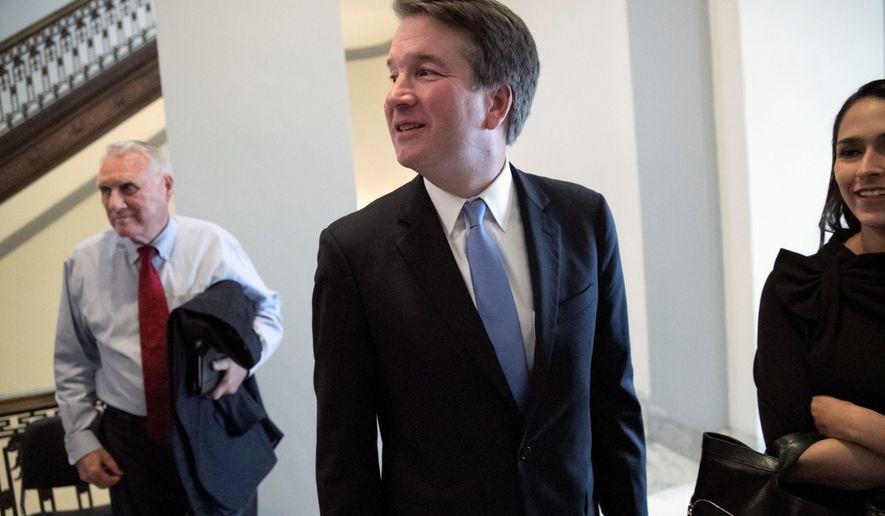Judge Brett M. Kavanaugh sees himself as a textualist in his approach to the Constitution, saying his first duty is to adhere to what its words say — la Supreme Court nominee Clarence Thomas in 1991.
Some legal scholars, though, say he could be described as more of an originalist in the vein of now Justice Thomas, looking for the intent of the document’s authors when they wrote it.
Either way, he’s likely to make conservatives happy and enrage liberals who would rather see the new Supreme Court justice take a “living document” approach his role on the federal courts, scholars say.
Judge Kavanaugh faces senators Tuesday for the first day of weeklong of hearings on his nomination to succeed retired Justice Anthony M. Kennedy.
He enters with the backing of nearly every Republican senator and opposition from nearly every Democratic senator. Perhaps fewer than 10 lawmakers haven’t indicated which way they will vote.
Yet guessing exactly how Judge Kavanaugh would decide cases on the high court is “fraught with uncertainty,” according to an analysis last month by the Congressional Research Service. It concluded that judges, once elevated to justices, sometimes strike out on their own.
That’s left legal scholars grappling with the judge’s record, searching for analogies to current or past justices they think he would resemble in practice.
Mitchell Berman, a law professor at the University of Pennsylvania, noted that Judge Kavanaugh’s reading of statutes differs from Justice Thomas’ philosophy.
“Thomas is an originalist who seems to be concerned often with, not just what the text means, but with what the framers originally intended or expected,” Mr. Berman said, adding that Judge Kavanaugh appears less attracted to that approach.
But Josh Blackman, a professor at South Texas College of Law, argued that there are elements of originalism in Judge Kavanaugh’s opinions and that all jurists — including those considered to be on the left side of the bench — have claimed to be textualists.
He pointed to the nominee’s dissent in a case in which his colleagues on the U.S. Court of Appeals for District of Columbia Circuit upheld the city’s ban against semi-automatic rifles. Judge Kavanaugh would have struck it down, saying it ran afoul of the constitutional rights protected by the Second Amendment.
“He’s more originalist than [late Justice Antonin] Scalia was on the Second Amendment,” Mr. Blackman said.
Justin Walker, who clerked for Judge Kavanaugh and is now a professor at the University of Louisville, said the judge is a “self-described textualist.”
“He starts with the text, and he goes where the text leads, as informed by structure, history and precedent,” Mr. Walker said, noting that the nominee does not hesitate when weighing constitutional principles.
“When the original meaning has been important to the constitutional analysis, Judge Kavanaugh has inquired into that meaning,” he said.
The Congressional Research Service, which did a nearly 200-page deep dive into Judge Kavanaugh’s opinions, compared him to President Trump’s first high court pick, Justice Neil M. Gorsuch, who during a dozen years on a federal appeals court in Denver, touted interpreting law based on the “original public meaning” of the Constitution.
“Judge Kavanaugh has not been as explicit,” the analysts concluded.
The nominee did hint about his approach during a speech last year at an event hosted by the American Enterprise Institute, a conservative think tank.
He said while in law school he found himself agreeing frequently with the late Chief Justice William Rehnquist, who would apply constitutional principles to current day situations — like extrapolating the Fourth Amendment’s protections against searches of the home to cars, even though automobiles weren’t contemplated when the Constitution was drafted.
“In class after class, I stood with Rehnquist. That often meant in the Yale Law School environment of the time that I stood alone,” Judge Kavanaugh recalled.
• Alex Swoyer can be reached at aswoyer@washingtontimes.com.




Please read our comment policy before commenting.